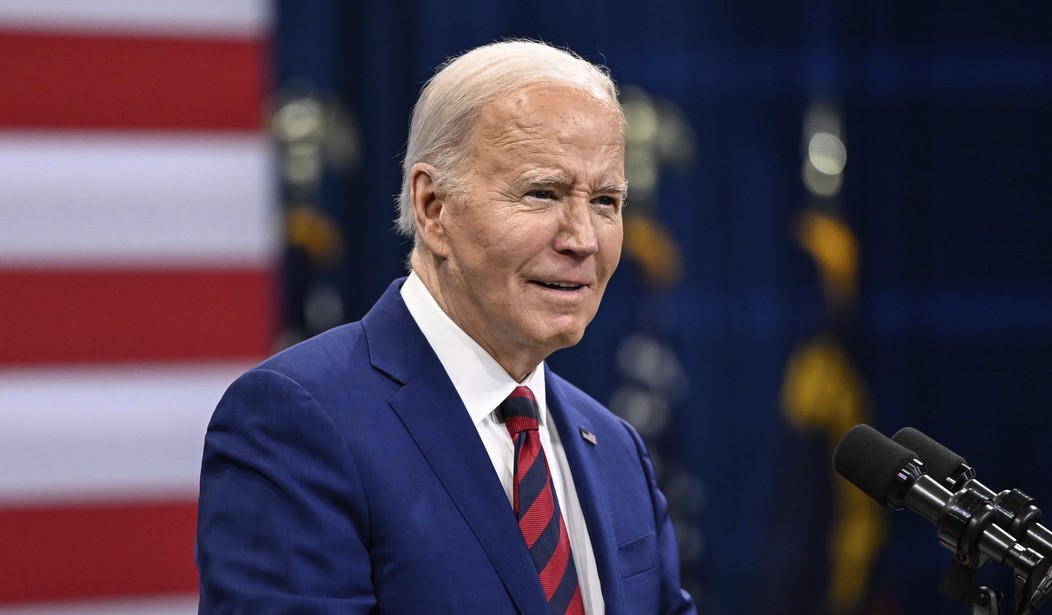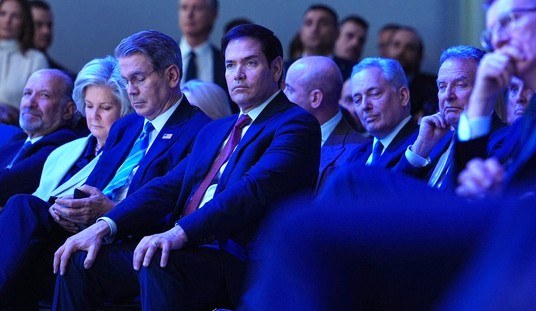It's been a week of major polls, with The New York Times/Siena College poll as well as the CBS News/YouGov poll which Townhall covered. While a takeaway from the former is that the gap is narrowing between President Joe Biden and former and potentially future President Donald Trump, the latter shows Biden's approval of his handling of the Israel-Hamas War is dropping. While it's noteworthy that this is his lowest approval rating for this poll on the issue – 33 percent – another arguably larger issue is why and with whom.
As Leah pointed out about the CBS News/YouGov poll, back in February, 51 percent of respondents ages 18-29 supported Biden's handling of the conflict, with that number now being down to 40 percent.
Although it's offset a bit elsewhere, Biden’s approval among younger people is down.
— CBS News Poll (@CBSNewsPoll) April 14, 2024
And there's been a drop among them on how Biden is handling the Israel-Hamas conflict. pic.twitter.com/4d93q7aZjB
But, the support that those younger Americans have for Biden has also gone down by double digits since just a few months ago, from 55 percent to 43 percent. His overall approval rating is at 40 percent, which is down from 42 percent in February.
"Although it's offset a bit elsewhere, his approval among younger people is down," the CBS News poll write-up mentions. That's not great news, considering such an electorate was key to Biden winning in 2020.
Anthony Salvanto, the elections & surveys director at CBS News, acknowledged "indeed" that there are generational and age differences regarding how those younger respondents are dropping their support.
Recommended
This also came up as Salvanto was speaking further about how an increasing number of respondents, specifically Democrats, say they have sympathies with Palestinians and that they want Biden to encourage Israel to stop their military actions. "Some of that pressure, and that downward pressure on his numbers, are coming from his own party's base," he said.
As CBS News' Caitlin Huey-Burns rightly notes, Biden's "absolutely going to need every member of his base to turn out in this election," though Democratic strategists like James Carville have warned not to expect the 2020 coalition to show up.
An increasing number of Americans want President Biden to encourage Israel to stop military actions in Gaza, a new @CBSNewsPoll finds. Compared to last October, there are fewer Democrats today who say the U.S. should send weapons and supplies to Israel, @salvantoCBS explains. pic.twitter.com/iG9DRWTtPy
— CBS News (@CBSNews) April 15, 2024
These findings about younger Americans and Biden's fellow Democrats are sadly unsurprising, given what the polls have been saying for months.
Particularly worth highlighting is the Quinnipiac poll from last November, which showed how a not insignificant number of young voters, ages 18-34, were even likely to blame Israel and sympathize with Hamas:
Perhaps most troubling of all, though, is that only a plurality--at 48 percent--of that age group say the think Hamas "is more responsible for the outbreak of violence in the Middle East." Other than the 55 percent of black respondents and 57 percent of Hispanics, at least 62 percent of all other demographics recognize that Hamas is. The 36 percent who say they think Israel is more responsible is by far the greatest percentage of any demographic.
The poll's write-up also highlighted how it's not just the Israel-Hamas conflict that is a problem for Biden. As newsy as the Israel-Hamas conflict is for the time being, the economy is still considered more of a top issue when it comes to polls that ask the question.
This poll also asked several questions concerning the economy, which don't bode well for the unpopular incumbent president. Thirty-one percent of respondents rate the economy as "fairly bad," while 30 percent say it's "very bad." Just 39 percent approve of how Biden is handling the economy, with that number being even worse on inflation, as 34 percent approve of how he's handling the issue. A majority also expect the economy next year to be at best "slowing, but not in a recession" or actually "in a recession," with each of those responses earning 26 percent support of respondents saying so.
A plurality of respondents, 35 percent, said they felt things in America were going "very badly," while 33 percent similarly said they thought it was going "somewhat badly." Among those respondents who chose either answer, the poll also asked them why they felt that way. Sixty-six percent said it had "a lot" to do with "the U.S. economy," and 72 percent said it had to do with "the state of U.S. politics."
In a section about Biden's declines and younger respondents, the poll pointed out:
But that said, politically, for the president it's still the economy that matters relatively more. For Democrats, and also for independents, Mr. Biden's handling of the Israel-Hamas conflict is not as connected to his overall job approval as are views of his handling of the U.S. economy.
That is, people are more likely to disapprove of Mr. Biden overall if they think he isn't handling the economy well than if they think he isn't handling the conflict well.
And that, in turn, doesn't have great news for him either. On the heels of the most recent inflation report, and the stock market drop that ensued, the months-long run-up of optimism about the economy has stalled for now. Views of it are still hovering in the mid-30's after regularly ticking up over the winter. And the percentage of Americans expecting economic growth has leveled off, too.
Just 35 percent say the economy is "good," with only 10 percent regarding it as "very good" and 25 percent saying it's "fairly good." A graphic shows the number of respondents saying it was "good" was slightly higher in February at 39 percent, while it was down to 35 percent in January and 30 percent last November.
Previous coverage highlighting other polls shows that young voters are badly affected by Biden's economic policies. This was especially the case with the CNBC/Generation Lab poll from February.
The CBS News poll was conducted April 9-12 with 2,399 U.S. adults and had a margin of error of plus or minus 2.6 percentage points.
While the CBS News poll stuck to approval ratings of Biden, The New York Times/Siena College poll offered key insight on who young voters prefer. Stunningly, Biden only has a lead of +1 over Trump among 18-29-year-old voters, 46 to 45 percent. A plurality, 40 percent, also said they "strongly disapprove" of how Biden is handling his presidency, while 27 percent "somewhat disapprove." While 50 percent said that Biden's presidency has been "not really good or bad for America," 42 percent said it's been "mostly bad," and just 8 percent said it's been "mostly good." They're the highest demographic to say it was not really either, and among the lowest demographic to say "mostly good."
For months, we've been examining whether or not Trump could make gains with young voters. At the very least, Biden isn't performing well with this key demographic or others. As we get closer to the general election, it looks like it will continue to be a pertinent question for what is almost certainly going to be a close, competitive race.

























